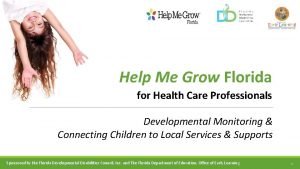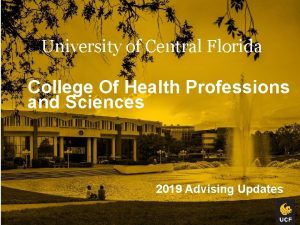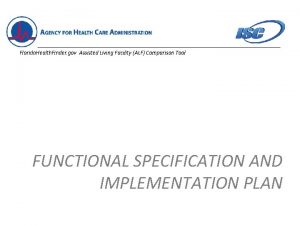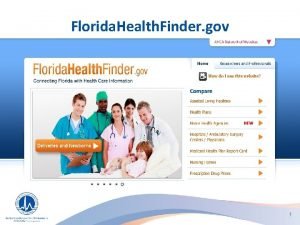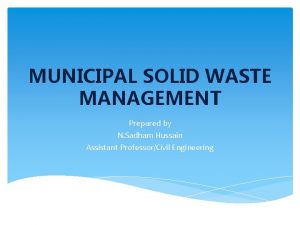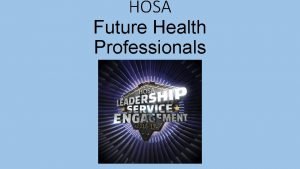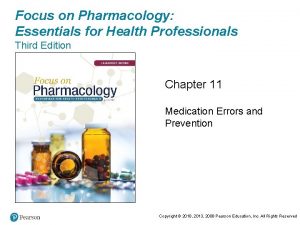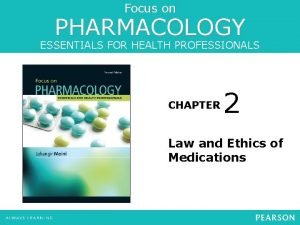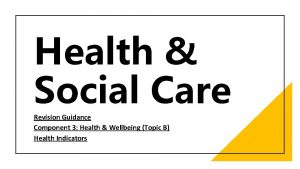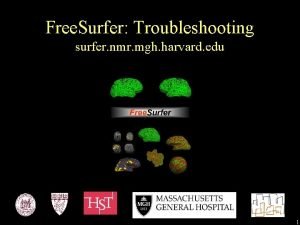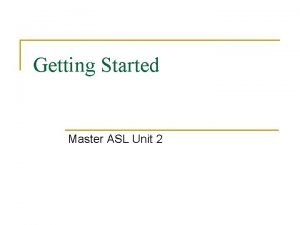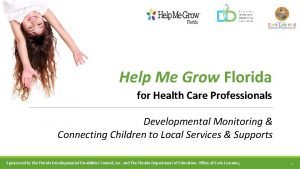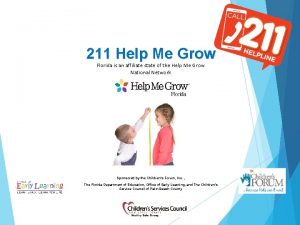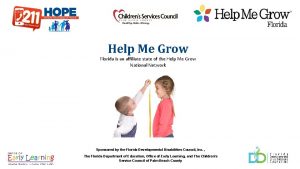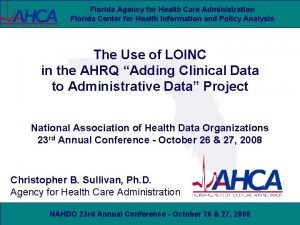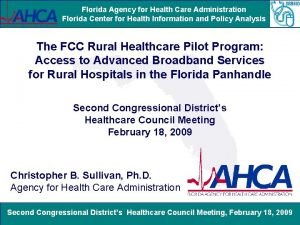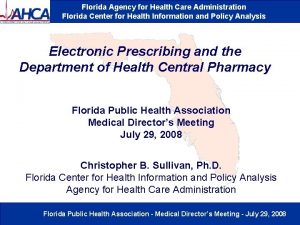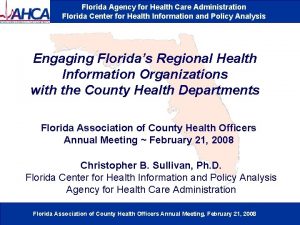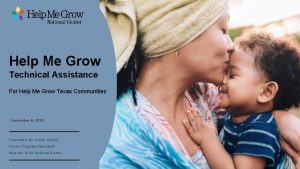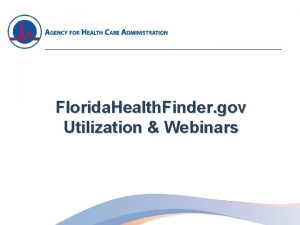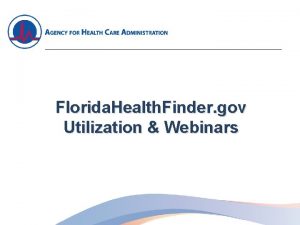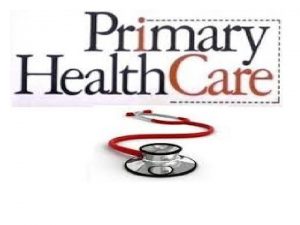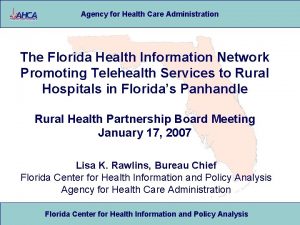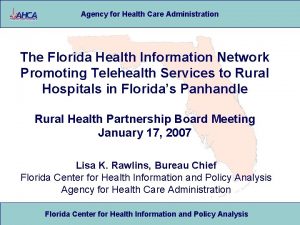Help Me Grow Florida for Health Care Professionals
























- Slides: 24

Help Me Grow Florida for Health Care Professionals Developmental Monitoring & Connecting Children to Local Services & Supports Sponsored by the Florida Developmental Disabilities Council, Inc. and The Florida Department of Education, Office of Early Learning 1

Key Points ★ Developmental surveillance and screening are integral to well-child care. ★ The American Academy of Pediatrics (AAP) recommends the use of surveillance at all well-child visits and the use of a formal screening tool at 9, 18 and 24 (30) month well child visits. ★ When concerns are identified for children ages birth through age 8, call 2 -1 -1 and ask for Help Me Grow, a free service. ★ Help Me Grow helps you connect children to the community-based services and supports they need. Sponsored by the Florida Developmental Disabilities Council, Inc. and The Florida Department of Education, Office of Early Learning 2

Why Are Surveillance & Screening Part of Pediatric Care? ★ Children see the doctor up to 12 times during the first two years of life for well care. ★ Research shows that 12 -16% of children are at risk for developmental and/or behavioral problems. ★ BUT without surveillance and screening, a majority of children aren’t identified as in need of services & supports. Washington AAP Developmental Screening Orientation Webinar Sponsored by the Florida Developmental Disabilities Council, Inc. and The Florida Department of Education, Office of Early Learning 3

How Surveillance & Screening Help You… » They help you understand the “big picture” of child’s development » They help you detect potential behavioral and developmental concerns during the vital period of early brain development. » They encourage connection to a range of supports and services for children and families. Adapted from A Comprehensive Model for Developmental-Behavioral Screening and Surveillance by Frances Page Glascoe, Ph. D. /Nicholas S. Robertshaw Sponsored by the Florida Developmental Disabilities Council, Inc. and The Florida Department of Education, Office of Early Learning 4

Developmental Surveillance Do you have any questions about how your child is learning, behaving or developing? Developmental surveillance should happen at every well-child visit. It has five components. 1. Elicit parental concerns 2. Document and maintain a developmental history 3. Observe the child 4. Identify risks and protective factors 5. Maintain an accurate record of findings over time, including input from others (schools, etc. ) Sponsored by the Florida Developmental Disabilities Council, Inc. and The Florida Department of Education, Office of Early Learning 5

Developmental Screening noun / de·vel·op·men·tal screen·ing / : the administration of a brief, validated, and standardized tool that aids in the identification of children at risk for a developmental, behavioral, or social concern American Academy of Pediatrics, “Identifying Infants and Young Children With Developmental Disorders in the Medical Home: An Algorithm for Developmental Surveillance and Screening, PEDIATRICS Vol. 118 No. 1 July 1, 2006, pp. 405 -420 Sponsored by the Florida Developmental Disabilities Council, Inc. and The Florida Department of Education, Office of Early Learning 6

What’s the difference between… Surveillance, Screening & Assessments? ★ Ongoing developmental surveillance is continued observation of a child over time. It gives you a longitudinal understanding of the child’s growth. ★ Developmental screening is a snapshot of a child at a single point in time. It complements ongoing surveillance. One doesn’t replace the other. ★ The results of a screening may indicate that other, more in-depth assessments, often done by specialists, are necessary. Sponsored by the Florida Developmental Disabilities Council, Inc. and The Florida Department of Education, Office of Early Learning 7

When to use Surveillance & Screening? The American Academy of Pediatrics (AAP) recommends that developmental surveillance be incorporated into every well child visit. The AAP recommends that standardized developmental screening tests be administered to all children at the 9, 18, and 24 (30) month visits. Developmental screening is valuable for all children from birth through age 8 and beyond. Sponsored by the Florida Developmental Disabilities Council, Inc. and The Florida Department of Education, Office of Early Learning 8

Commonly Used Screening Tools ★ Ages & Stages Questionnaire-3 (ASQ-3) ★ Ages and Stages Social Emotional (ASQ: SE-2) ★ Parents’ Evaluation of Developmental Status (PEDS) Sponsored by the Florida Developmental Disabilities Council, Inc. and The Florida Department of Education, Office of Early Learning 9

Ages & Stages Questionnaire-3 (ASQ-3) ★For children ages 1 month to 66 months ★10 -20 minutes for caregiver to complete Agesandstages. com ★2 -3 minutes to score ★Available in English and Spanish ★One-time purchase then materials can be copied ★In surveys, overwhelmingly popular with families Sponsored by the Florida Developmental Disabilities Council, Inc. and The Florida Department of Education, Office of Early Learning 10

How is the ASQ-3 different from the… Ages & Stages Questionnaire: Social-Emotional (ASQ: SE-2)? ★Modeled after the ASQ-3 ★Screens for social and emotional behaviors ★For ages 1 -72 months ★Available in English and Spanish ★Designed to be used alone or with ASQ-3 Sponsored by the Florida Developmental Disabilities Council, Inc. and The Florida Department of Education, Office of Early Learning 11

Parents Evaluation of Developmental Status (PEDS) ★10 questions that ask about parental concerns www. pedstest. com ★Forms are not age specific, so practice uses the same form at every well-child visit ★Available in many languages ★5 minutes for parents to complete, 1 to 2 minutes to score ★Composite scoring sheet that can be kept in the medical record Sponsored by the Florida Developmental Disabilities Council, Inc. and The Florida Department of Education, Office of Early Learning 12

Other Commonly Used Screening Tools ★Modified Checklist for Autism in Toddlers (M-CHAT-R): 18 and 24 month visits ★Pediatric Symptom Checklist (PSC): 4 to 18 years, primarily for mental health screening Sponsored by the Florida Developmental Disabilities Council, Inc. and The Florida Department of Education, Office of Early Learning 13

How do I implement… Surveillance & Screening in My Office? Call 2 -1 -1 and ask for Help Me Grow. We can help you develop surveillance and screening systems that work for your office. Sponsored by the Florida Developmental Disabilities Council, Inc. and The Florida Department of Education, Office of Early Learning 14

Help Me Grow is a system for early identification of developmental and educational concerns that links children and their families to community-based services and supports. Sponsored by the Florida Developmental Disabilities Council, Inc. and The Florida Department of Education, Office of Early Learning 15

Who can I refer to Help Me Grow ? 3 Examples Talking with mom and dad, you learn that they aren’t comfortable reading to their son, even though they would like to. “Can I help them? ” you think. YES! Call 2 -1 -1 and ask for Help Me Grow. HMG Care Coordinators can connect mom & dad to family supports and parenting assistance. At the end of an appointment, a mom mentions that her son has been kicked out of preschool for behavior. “Can you help me? ” she asks. YES! Call 2 -1 -1 and ask for Help Me Grow. HMG Care Coordinators can connect mom to supports for her son’s behavioral issues. A dad is concerned by his daughter’s frustration when she tries to speak— and nothing he does seems to helps her. “Can you help me? ” he asks. YES! Call 2 -1 -1 and ask for Help Me Grow. HMG Care Coordinators can connect the family to language & communication services. Sponsored by the Florida Developmental Disabilities Council, Inc. and The Florida Department of Education, Office of Early Learning 16

1 7 Well-child visits (Surveillance & Screening) Information loops back to you from HMG 2 You solicit family opinions Help Me Grow in 7 Steps 6 Family connected to resources 3 Together, identify behavioral and/or developmental concern 5 4 HMG Care Coordinator provides resources You or family contact Help Me Grow Sponsored by the Florida Developmental Disabilities Council, Inc. and The Florida Department of Education, Office of Early Learning 17

How to Use Help Me Grow ★ CALL 2 -1 -1 and ask for Help Me Grow Care Coordinators will then contact the family. ★ INSTRUCT a family to call 2 -1 -1/Help Me Grow during an office visit. “How about you make the call now? I’ll go see another patient and connect back with you. ” ★ WRITE a “prescription” to call 2 -1 -1/Help Me Grow ★ FAX a referral form to Help Me Grow (call 2 -1 -1/HMG forms) Help Me Grow Care Coordinators will contact the family. Sponsored by the Florida Developmental Disabilities Council, Inc. and The Florida Department of Education, Office of Early Learning 18

Barriers to Surveillance & Screening… …and How Help Me Grow Eases Them Lack of system for linkage to community-based referral resource Help Me Grow is a FREE service that links children to communitybased resources No time to learn the range of resources available Help Me Grow maintains a comprehensive, up-to-date resource directory Unfamiliarity with screening tools Help Me Grow can provide trainings on screening tools Sponsored by the Florida Developmental Disabilities Council, Inc. and The Florida Department of Education, Office of Early Learning 19

Barriers to Surveillance & Screening… …and How Help Me Grow Eases Them Insufficient time Help Me Grow streamlines the referral process Concerns about cost Help Me Grow is a FREE service for you and your patients And speaking of costs… A 2012 study found that use of Help Me Grow in Orange County, CA, for one year resulted in a reduction of $500, 000 in the health care system there. Nationally, this could lead to health care cost-savings of more than $50 million annually. Sponsored by the Florida Developmental Disabilities Council, Inc. and The Florida Department of Education, Office of Early Learning 20

Help Me Grow Physician Champions Credibility. Authority. Connection. • Facilitate outreach trainings at doctors’ offices • Promote Help Me Grow to physician community • Present at state medical meetings, including the American Academy of Pediatrics (AAP), about the Help Me Grow system Call 2 -1 -1 and ask for Help Me Grow to learn more. Sponsored by the Florida Developmental Disabilities Council, Inc. and The Florida Department of Education, Office of Early Learning 21

Help Me Grow & Maintenance of Certification You can earn Part 4 Maintenance of Certification credits for surveillance, screening and using Help Me Grow to connect children to evaluation and intervention services. • 6 -month chart audit activity approved by the American Board of Pediatrics that can be completed by office staff • One or all pediatricians in the practice receive credits • Cost is $50 and contact Sara Sibley at Connecticut Children’s Medical Center (Smartel@connecticutchildrens. org) to enroll Sponsored by the Florida Developmental Disabilities Council, Inc. and The Florida Department of Education, Office of Early Learning 22

In Summary ★Developmental surveillance and screening are integral to well-child care for the first 8 years of life. ★AAP recommends the use of surveillance at all well -child visits and the use of a formal screening tool at 9, 18 and 24(30) month well child visits. ★When concerns are identified for children ages birth through age 8, call 2 -1 -1 and ask for Help Me Grow, a free service. ★Help Me Grow helps you connect children to the community-based services and supports they need. Sponsored by the Florida Developmental Disabilities Council, Inc. and The Florida Department of Education, Office of Early Learning 23

Keep in touch! Katherine Suarez Espinosa, Ed. S. Help Me Grow Florida State Coordinator katherinese@fddc. org 786 -221 -0670 ext. 119 Sponsored by the Florida Developmental Disabilities Council, Inc. and The Florida Department of Education, Office of Early Learning 24
 Help me grow florida
Help me grow florida Florida association of environmental professionals
Florida association of environmental professionals Apk 2300 ucf
Apk 2300 ucf Florida health care coalition
Florida health care coalition Floridahealthfinder.gov facility locator tool
Floridahealthfinder.gov facility locator tool Florida nursing home finder
Florida nursing home finder Help me grow sacramento
Help me grow sacramento Types of health professionals
Types of health professionals Health professionals follow-up study
Health professionals follow-up study Allied medical professionals list
Allied medical professionals list Allied health professionals
Allied health professionals What is waste management
What is waste management Nc hosa
Nc hosa Focus on pharmacology essentials for health professionals
Focus on pharmacology essentials for health professionals Focus on pharmacology
Focus on pharmacology Levels of care primary secondary tertiary quaternary
Levels of care primary secondary tertiary quaternary Health and social care unit 2
Health and social care unit 2 Health and social component 3
Health and social component 3 Help us help you
Help us help you Im being oppressed
Im being oppressed Helper
Helper Education through self help is our motto
Education through self help is our motto My mother makes me chicken
My mother makes me chicken Help us help you
Help us help you Florida kid care
Florida kid care
